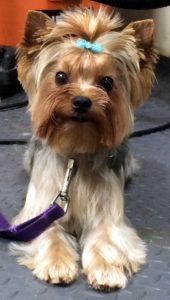Yorkshire Terriers, also known as “Yorkies,” may be small in size, but they have big, lovable personalities. The dogs are feisty but loving companions, making them one of the most popular toy dog breeds in the United States. Yorkies are relatively adaptable dogs, and their small size allows them to live comfortably in apartments and fly in the cabin on airplanes. Like most toy breeds, they can be a little difficult to housetrain, meaning pet parents should invest the necessary time to prepare their dogs for travel. Likewise, Yorkies are often described as “yappy,” barking at unexpected sounds, and their delicate statures are unfit for transit in the cargo hold of a plane. Still, with a little training, they can become the perfect travel companion. Plus, they’re hypoallergenic, and that’s something you can’t teach a dog.

…HAVE EVERYTHING?
Size and Travel Options
Yorkshire Terriers are truly tiny, standing between 7-8 inches and weighing no more than 7 pounds. The Yorkie’s small size should make it an excellent candidate for air travel. Most dogs are significantly smaller than the maximum carrier measurements imposed by airlines. These dogs can also easily ride in other forms of public and semi-public transportation, including trains, subways, and buses. However, owners should note that Yorkies rarely get along with other dogs, and the sight of another animal may send your pooch into a barking fit. To that point, this breed is known for being high-strung. Easily excitable and very vocal, these little guys love to bark. If you plan to travel with your Yorkshire Terrier, spend several weeks—even months—training him to behave in public spaces. If your dog is too loud in the airport, you may not be allowed to board.
Personality as a Travel Companion
Yorkie’s are excitable, talkative dogs. Though intelligent, the breed is notoriously difficult to train; breeders and pet parents alike have difficulty housetraining reluctant Yorkies. In most cases, this is due to their stubborn nature, so incentivizing with treats and other rewards is a good idea. When preparing for a flight, do your best to train the dog to limit noise production and remain calm despite loud noises. Smart and self-assured, these adventurous dogs can display a range of personalities—your Yorkie may be especially easy to train. Start training as a puppy, allow the dog to socialize, and expose him to different people, sights, sounds, and experience. This will allow the animal to become comfortable in a variety of situations and allow him to develop coping mechanisms that don’t involve barking.
Finally, Yorkies require consistent grooming, often by a professional. If you are planning to rent a car during your trip, we recommend getting your dog’s hair cut prior to the trip. If you can’t bear to have the Yorkie’s long, silky coat cut, daily brushing will be required. With proper training and a little of patience, a Yorkshire Terrier can be an excellent travel companion.
Health and Longevity
As with most toy breeds, Yorkies come with their own set of health and physiology issues. The dogs often live to be about 11-15 years old, making them excellent life companions. However, the breed is known to be especially susceptible to hip dysplasia and patellar luxation, conditions that may limit the dog’s movement and ability to stand for periods of time. If you plan to travel with your Yorkie, ensure he can comfortably sit or lie down within the carrier—standing for long periods with one of these conditions can be painful, which will lead to fits of barking and potential trauma. Additionally, Yorkies may experience collapsed tracheas, which is characterized by a chronic, dry, harsh cough. Flight and travel will not necessarily exacerbate this respiratory issue, but care should be taken to address this potential ailment in the weeks and months leading up to the flight.
Yorkshire Terrier Breeders and Adoption Centers
This breed isn’t just one of the most popular; it’s also in high demand. While rescue and adoption centers may offer adult dogs for several hundred dollars to support the facility and pet care services. For a Yorkshire Terrier of strong pedigree from a reputable breeder, you might pay anywhere from $1,000-$5,000+.